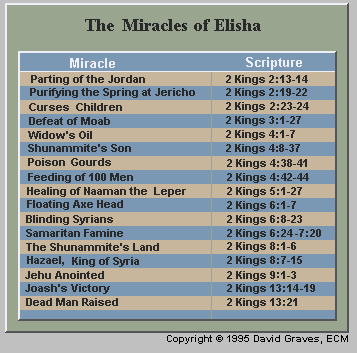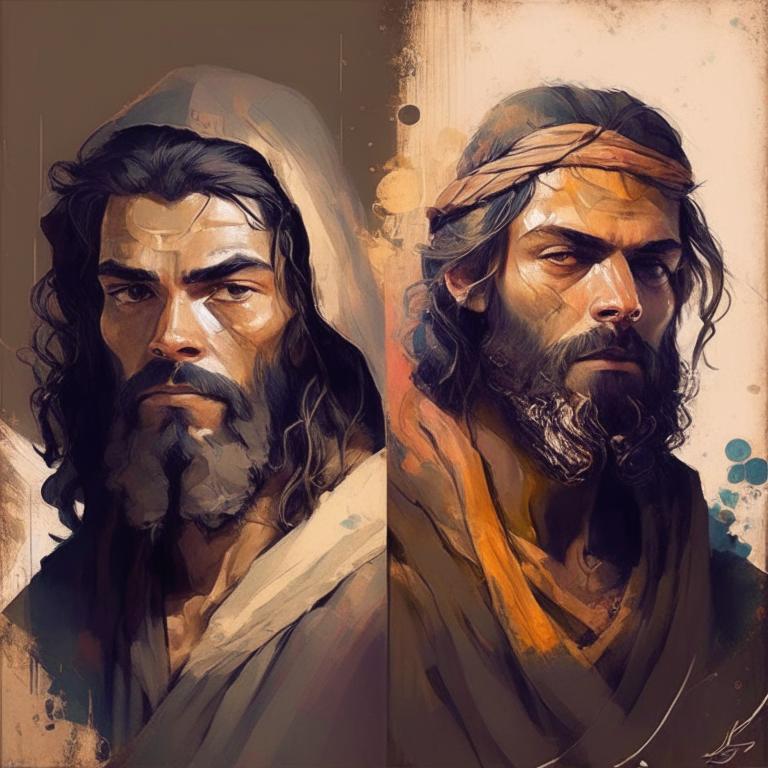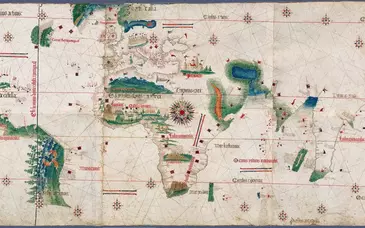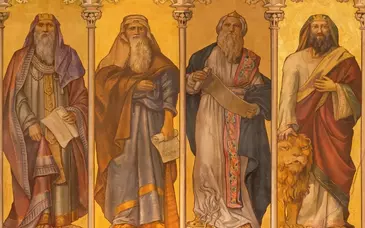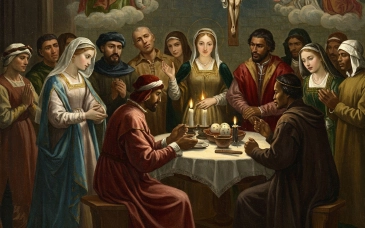Elijah
Name

Elijahs name means 'My God is Yahweh'. In biblical times a mans name revealed some part of his personality or character. 1 Samuel 25:25 His name was both the explanation of his character and the declaration of his ministry. He is said to be a Tishbite from Tishbe in Gilead. 1 Kings 17:1 Little is known about his background in fact he is often compared to Melchizedek who had no record of birth or death. While Elijahs death is recorded nothing is said of his mother or father. His ministry is recorded in 1 Kings 17-19; 21:17-29 and 2 Kings 1-2.
Background
In the early chapters of 1 Kings under king Solomons rule the temple is built and Gods glory dwells among the people of Israel. The boarders of Israel are expanded and there is peace and prosperity throughout the land. But chapter 11 is a turning point. 1 Kings 11:1-6 From this point on the glory of Israel began to depart. God stirs up adversaries and takes up the sword against Israel. The kingdom is divided under Solomon's sons Jeroboam and Rehoboam and they begin a downward pattern of idolatry and covenant unfaithfulness. 1 Kings 19:10 It climaxes in King Ahab whose ambition was to be more evil than all of the other kings. 1 Kings 16:29-34
While Judah provoked the Lord to jealousy, Israel was abandoned by God. During this period there are many kings in Israel, showing that there was no longer any respect for God's king in Israel. Omri built the capital of Samaria but it was merely a place of open idolatry. Israel's greatest sin was that they cut themselves off from their source of promised salvation through David's greater Son by going to war with Judah.


Ahab takes Jezebel as his wife who is steeped in Baal and Asherah worship. And so in God's mercy the greatest of the prophets is raised up during the reign of the wickedest King. The repudiation of the worship of Jehovah started way back when Solomon married foreign wives and worshipped foreign gods. But that was more a private act compared to what was now wide spread open idolatry.
Elijah's ministry is found in opposition to the cult of Baal. There were 850 false prophets devoted to the promotion of Baal worship. They ate at Jezebel's table to promote Baalism. Elijah appears on the scene as though dropped from heaven in 1 Kings 17:1.

Drought
Elijah begins his ministry by announcing a drought for three years during the reign of King Ahab, and as a result had to flee for his life. James states that Elijah prayed to God that there would be no rain for three years and six months. James 5:13-18 James compares the prayer of Elijah to the prayer of faith. But shutting up the heavens was not a new idea with Elijah. It was actually the fulfillment of the promised threat of the covenant Lord. Deuteronomy 28:15, 22-24
Elijah was simply bringing his life in line with God's covenant promises. He was merely praying the revealed will of God as revealed in Scripture. The prayer of faith then is to ask God to accomplish what He has promised in His Word. Prayer is to be brought in line with the Scriptures.
Brook Cherith and the Widow
Having upset King Ahab Elijah hides near the brook Cherith. At God's command Elijah was to Absent himself from Israel. Part of the divine judgment was to hide the prophet, so there would also be a famine of the word of God. Amos 8:11-12 He is fed by the Lord by means of ravens who brought him bread and meat twice a day. 1 Kings 17:2-6 A reminder that God provides our daily food. Matthew 6:11 When the brook went dry because of the drought God instructed Elijah to get water and lodging from a widow in Zarephath. At the widows home both were miraculously sustained by God. The flour and oil in her jars never empty, every day they are full. But with blessing also comes trials and her son dies which she blames on the visiting prophet. But her son had not died because of her sin John 9:1-3 but in order that God's glory and power might be made known through the raising up of her son by the prophet. 1 Kings 17:17-24 Her response is prayer and worship.
Contest with Propehts of Baal

In the third year of the drought Elijah leaves Zarephath to meet Ahab, and in a contest with the priest of Baal proposes that fire should come down from heaven and light the altar of the true God. The prophets gather on Mt. Carmel. Two altars where constructed. The prophets of Baal were to call down fire from their God but nothing happened. They even cut themselves and shouted to wake him up and get his attention but nothing happened. When it came to Elijah's turn he had their prophets drench his altar three times with water and when it came time for the evening sacrifice, he prayed and God sent fire from heaven which consumed the altar and all of the water as well. The people confess the deity of Yahweh and have the prophets of Baal put to death that day. God shows the people that he will accept their offerings if brought to him properly. With the prayer of Elijah the drought ended and the heaven opened up and it rained. 1 Kings 18:20-46
Depressed Prophet
Elijah is threatened by Jezebel and flees to Horeb, where he falls into a deep depression. Elijah goes from the mountain top experience to the valley of despair. So God reveals himself to Elijah in a still small voice and reminds the prophet that God still has 7000 faithful prophets who have not bowed the knee to Baal. His work was not over yet. The best cure for depression is to remember who God is and get to work. Elijah is divinely commissioned to anoint Hazael king over Syria, Jehu king over Israel, and Elisha to be prophet in his place. However Elijah only carried out the last anointing and Elisha had to finish what Elijah was told to do.
Message to Ahab
Elijah returns to Ahab's house to confront him over unjustly taking Naboth's vineyard by killing him. Elijah placed a curse on the Omri Dynasty, and prophesied that he would be destroyed in battle. So he would not be recognised by the Syrians in battle, Ahab disguised himself, but a stray arrow pierced his armour and he died on his way back to Samaria in his own chariot.
Message to Ahaziah
King Ahaziah, Ahab's son, became sick and inquired of Baal-Zebub, the God of Ekron whether he would get well again. Elijah sent word that he would not because he did not seek the Lord's word. Upset by Elijah's words King Ahaziah, tries to kill the Prophet on two occasions but both times the soldiers were struck down by fire from heaven. The third time the soldiers plead for their lives and Elijah hears their cry and spares their life if they will take him to the king. 2 Kings 1:9-17 Before King Ahaziah, Elijah conveys the same message that he sent by messenger, he would not recover from his bed of sickness, and dies a short time after.
Chariot of Fire

Elijah is taken up into heaven without dying. Before he departed Elijah gave Elisha a double portion of his spirit to carry his ministry. Elisha is the eyewitness of the events and records that a chariot of fire appeared and took Elijah up into heaven in a whirlwind. 2 Kings 2:1-18 His ascension is a clear prophecy pointing to Christ who would ascend into the heavens. Many of the miracles and healings of Elijah and Elisha are meant to point to the ministry of Christ. The intention of both Jesus and Elisha was never to put on a show but to demonstrate the power of the Word of God to produce life.
Even seven years later Elijah's ministry is felt in letter that is sent to wicked King Jehoram of Judah that had been written by Elijah earlier in his ministry. It stated that Jehoram would be severely punished for his sin. 2 Chronicles 21:12-15
John the Baptist
Malachi states that Elijah would appear again. Malachi 4:5,6 He would be the forerunner to the Messiah. Jesus says that this prophecy was fulfilled in John the Baptist. Matthew 17:1-13. John was a reproduction of Elijah. Both were prophets, preached repentance, wore coarse clothes and lived off the land, existed in the wilderness, people flocked to hear them. Some doubted that John was the Elijah spoken of by Malachi.
John denied being Elijah in the literal Jewish sense. Matthew 11:7 The Jews looked for the real personal Elijah to come back and be resurrected. But as Jesus understood John as Elijah, John the Baptist would agree with this. John the Baptist would not deny being the fulfillment of the prophecies of Isaiah and Malachi. Jews today still look for the physical reappearance of Elijah and so set up an empty chair for him at circumcisions.
Elisha
Name
Elisha's name means 'God is Salvation'. He ministered during the reigns of Jehoram, Jehu, Jehoahaz and Joash for more than fifty years. Beginning in around 850 B.C. through to 800 B.C. Elisha's father was Shaphat, from Abel-meholah in the centre between the Dead Sea and the Sea of Galilee.
Elisha's Call
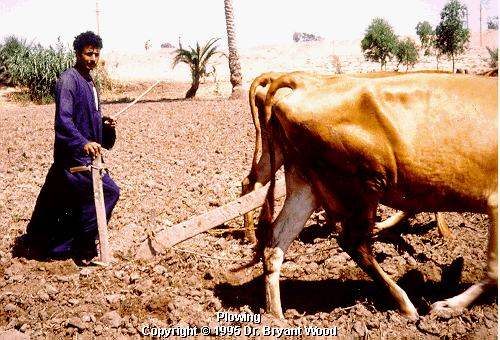
God's instruments for ridding Israel of Baal worship were three men, Hazael King of Syria, Jehu King of Israel and Elisha the Lord's prophet. So Elijah goes to Elisha plowing in the field of Abel-meholah and passes the prophetic mantle to him. In obedience Elisha breaks up his farm tools to make a fire and cook his yoke of oxen as a farewell feast. 1 Kings 19:15-21 Elisha becomes Elijah's disciple for a short period of time to training in the school of the prophets. Before Elijah's departure up into the heavens, Elisha asks for a double portion of God's spirit upon his ministry. Not twice as much as what Elijah had but rather two portions of it as a first born son was entitled to a double portion of the inheritance. Deuteronomy 21:17
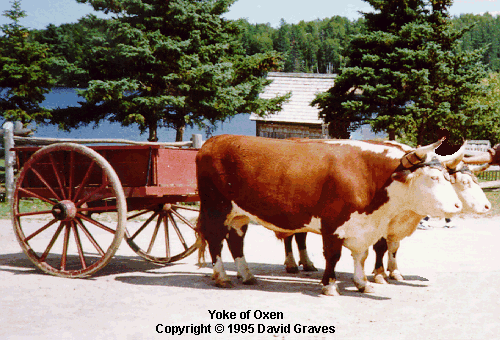
As Elisha returned from the ascension of Elijah he took the mantle and struck the river Jordan which parted the waters. This reassured the watching prophets that Elijah's spirit and authority had indeed been passed to Elisha. Elisha then made a journey through Jericho, Bethel, Carmel and back to Samaria visiting the Schools of the prophets and performing miraculous signs. 2 Kings 2:19-25
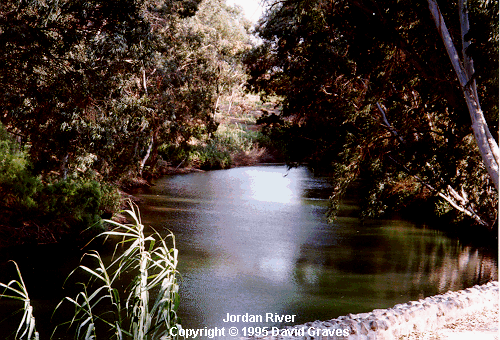
Jehoram
Now what Elijah had been to Ahab, Elisha would be to Jehoram. (852-841 B.C.) While Jehoram(or Joram) got rid of the altars of Baal, his sin was that of Jeroboam in worshipping the Asherah poles. 2 Kings 3:3 During his reign he waged war against Moab, with the help of Judah and Edom.
Elisha became a close military and political advisor to the king, during this time despite Israel's continued idolatry, God would still bless Israel in keeping with his covenant to Abraham. 2 Kings 13:23 So Elisha would reveal the location of the Syrian surprise attacks on Israel, and Jehoram would surprise the Syrians
Widow's Oil
A widow comes to Elisha because creditors have threatened to take here two sons slaved for her debts. So Elisha sends her throughout the town to collect all of the jars she can find and fill them with the little oil that she has in one jar. When all of the jars are filled she sells them and pays off her debt. This was done to demonstrate to Israel their failure to act compassionately and reveal the grace and mercy of God toward his people the poor and needy. God revealed their failures. 2 Kings 4:1-7.
Shunammite's Son
A notable woman from Shunem, often kept Elisha as he passed through town and proposed that they furnish a room for him in their house. During one of his trips, he stopped and in return for her favour prophesied that within a year she would have a son as she was barren. The prophecy came true but within a couple of years the son became ill and died. She went to the prophet who sent his servant Gehazi, to place Elisha's staff on his face but nothing happened. So Elisha himself came and prayed over the body and placed his own body over the dead boy and was brought back to life. Again the grace and power of His resurrection was displayed before Israel. 2 Kings 4:8-37
Healing of Naaman
Naaman who was the commander of the Syrian Army was a leper. They were not banned from society like they were in Israel, but none the less desired healing. A servant girl in Naaman's house had been captured on one of the raids into Israel and Elisha's activities had become well known. She suggested to Naaman's wife that they send for the Prophet of Israel to heal him. Naaman comes as the kings ambassador with gifts for the king of Israel.
Jehoram misunderstood their intentions, thinking that they had come to make war, but sends them on to Elisha's house. The instruction that Naaman received were not what he had expected. He was told to bathe seven times in the Jordan River, to be cured. Naaman took it as an insult, insisting that he could wash in the rivers of Syria which were cleaner than the muddy Jordan. His servants convinced him to do the simple, rather than expect the difficult. He did as instructed and was healed. Cleansing comes through faith. 2 Kings 5:1-27
In gratitude Naaman tried to give Elisha a gift but was turned down. Gehazi, Elisha's servant had overheard the conversation and motivated by his greet, he went after Naaman and lied to him to receive two talents of silver and two festive garments. Upon Gehazi's return he acted as if nothing happened, but God had revealed everything to his prophet. Elisha's reply was 'is this a time for accepting gifts?' and Gehazi was struck with Leprosy. God's grace is a gift not a payment. In contrast when one of the sons of the prophets who had lost his gift of an axe, truly valued a gift, the prophet made the axe head float so it could be recovered. Even gravity works as God's servant for grace. 2 Kings 6:1-7
Jehu
Jehoram has received a wound in battle and was recovering at Jezreel, when Elisha sent his servant to anoint Jehu the king of Israel. He was the commander of the army, and declared that he was king and killed Jehoram of Israel and Ahaziah of Judah. 2 Kings 9:14-29 Jehu saw to it that Elijah's words of judgment on Omri's household came true, all were killed.
Miracles
Elisha's miracles were not trivial performances for simple showmanship but rather were done to reveal the power and grace of God to a discouraged Israel. It was to authenticate the message and the messenger, it was not the message. God would establish his sovereign power as worthy of the people's faith. The idols held no power and were to be abandoned for faith in Yahweh. Many of the miracles and healings of Elijah and Elisha are meant to point to the ministry of Christ. The intention of both Jesus and Elisha was never to put on a show but to demonstrate the power of the Word of God to produce life.
